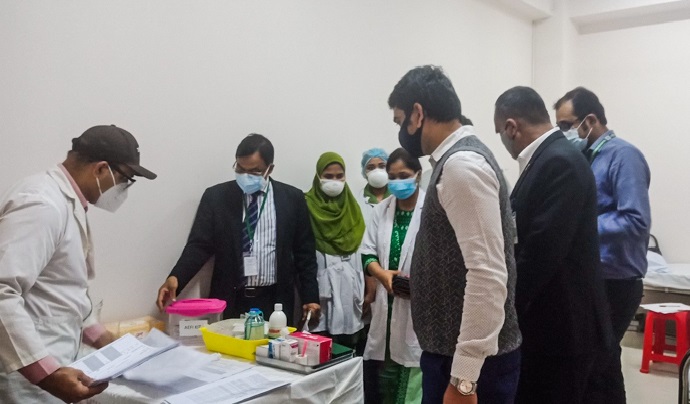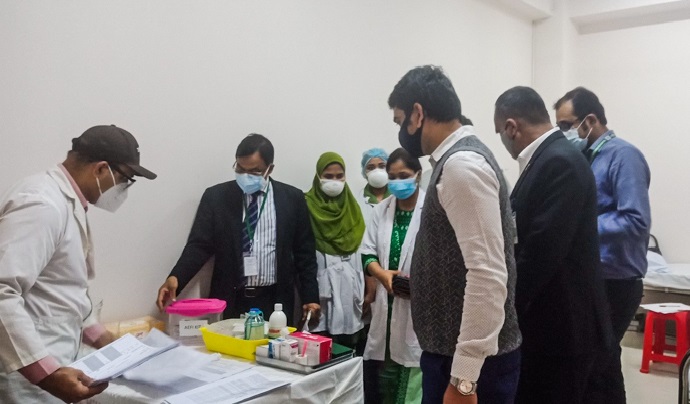Implementing COVID-19 Vaccine Safety Surveillance in Bangladesh
Implementing COVID-19 Vaccine Safety Surveillance in Bangladesh

Bangladesh’s effort to vaccinate its population of 160 million people against COVID-19 is currently underway. The government has committed to purchasing 30 million doses of an approved COVID-19 vaccine (Covishield) and receiving 11 million more doses from the global COVAX facility (Covishield and Pfizer/BioNTech).
The novel COVID-19 vaccines were developed in record time and created using some new technologies never previously administered to humans on such a grand scale. To that end, a surveillance system that can track the adverse events following immunization (AEFIs)—including joint pain, fever, or anaphylaxis, as well as rare adverse reactions such as vein thrombosis—is critical to ensure that vaccinated individuals remain safe.
Working with the Bangladesh Ministry of Health and Family Welfare (MOHFW), the USAID Medicines, Technologies, and Pharmaceutical Services (MTaPS) Program will establish and implement vaccine safety monitoring systems. The spontaneous reporting and active surveillance systems will address challenges, such as the lack of vaccine safety surveillance infrastructure, technical expertise, and dedicated personnel.
Vaccine pharmacovigilance (PV)—the practice of detecting, assessing, understanding, responding to, and preventing AEFIs—is an integral part of vaccine safety regulation and helps sustain public confidence in immunization programs. Rare AEFIs, particularly adverse reactions unique to populations, are often identified after a new vaccine receives authorization.
Setting Up National Pharmacovigilance for COVID-19 Vaccines
MTaPS is implementing a multifaceted approach in developing a COVID-19 vaccine safety surveillance system in Bangladesh:
AEFI Reporting System and Monitoring at the National Level
MTaPS is working with the Directorate General of Drug Administration (DGDA) under the MOHFW to align guidance and tools with the latest World Health Organization (WHO) recommendations. In collaboration with WHO, MTaPS assisted in developing and implementing an online AEFI reporting system for COVID-19 vaccines on the DGDA’s website. MTaPS developed the system in consultation with the DGDA, the Expanded Program on Immunization, and the National AEFI Expert Review Committee for use by the staff across the national vaccination centers.
Nearly 1,000 staff across Bangladesh have received training in COVID-19 PV and AEFI identification and reporting. Additionally, MTaPS will train staff on reporting COVID-19 PV data on the WHO-Uppsala Monitoring System’s VigiFlow system for global access and analysis.
MTaPS also supports the DGDA’s Adverse Drug Reaction Monitoring Cell in conducting periodic compliance checks at vaccination sites to ensure patient safety. This measure can prevent a patient who suffered anaphylaxis or another adverse reaction from receiving the second vaccine dose. Compliance checks will also ensure that each vaccination site has trained staff and the life-saving medication needed to treat anaphylaxis.
Surveillance at the District and Divisional Level
MTaPS coordinates with the Civil Surgeon and district/city corporation AEFI committees to investigate and conduct causality assessments of severe or unusual AEFIs and assess the frequency, severity, and cause, as well as related community concerns and programmatic implications. The resulting data analysis, investigation reports, and AEFI causality assessment enable the National AEFI Committee to develop recommendations for the DGDA to take the necessary regulatory actions, inform COVID-19 vaccine safety communication, and other programmatic strategies.
Safety Surveillance Research Collaboration
MTaPS is collaborating with the Institute of Epidemiology, Disease Control and Research to finalize an active safety surveillance protocol for the COVID-19 vaccines in Bangladesh.
Ensuring Vaccine Safety for a Successful Immunization Program

MTaPS’ cross-cutting approach—from partner coordination and technical guidance to capacity building and implementation—is crucial to ensuring public confidence in and the ultimate success of the ongoing COVID-19 vaccination program across Bangladesh. Ultimately, the safety monitoring systems will instill public confidence in the vaccine and support the ongoing successful immunization program.